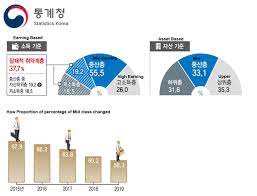China, US Have More Wealth Gaps Than Japan, Korea
By wchung | 31 May, 2025
China, a nominally socialist nation, has one of the world’s highest income gaps, with a Gini coefficient of 41.5% in 2007, far closer to the 45.0% of the US than the 25 – 28 range seen in most truly socialist nations.
The Gini coefficient is the measure most often used as an indicator of income inequality. It can be expressed in a decimals or in percentages, with 1.0 or 100% indicating maximal inequality, as where one person or segment of the population has all the income, while a coefficient of 0.0 or 0% indicates perfect income equality among all groups.
Generally, the highest Gini coefficients are seen in relatively underdeveloped nations in which a few powerful individuals control the bulk of the wealth. For example, Namibia’s Gini coefficient was 70.7% in 2003 according to the CIA World Fact Book, and South Africa, which is still suffering from the extreme income inequality produced by a long period of apartheid, had a coefficient of 65.0% in 2005.
Gini coefficients are less extreme but relatively high in free-wheeling capitalist economies that impose few restrictions on the accumulation of wealth. For example, Hong Kong — one of the world’s richest societies — had a Gini of 53.3% in 2006 while Singapore, a society with few restrictions on business albeit tightly paternalistic reins on social norms, has a Gini of 47.8% in 2009.
On the other extreme among advanced nations are the prosperous northern European socialist states like Sweden (23.0% in 2005), Norway (25.0% in 2008), and Finland (26.8% in 2008).
Japan, S. Korea and Taiwan — advanced, prosperous nations regarded as aggressive business and industrial powers — have surprisingly low levels of income inequality as measured by their Gini coefficients but higher than those of northern European socialist nations. Japan’s was 37.6% in 2008, Taiwan’s was 32.6% in 2000, and S. Korea’s was 31.4% in 2009, declining to the 29.0% range in 2011.
Those East Asian nations are more similar to European nations with social systems that are a hybrid of capitalist and socialist characteristics like Germany (27.0% in 2006), France (32.7% in 2008), Switzerland (33.7% in 2008) and Italy (32.0% in 2006).
Less developed Asian nations have somewhat higher Ginis, comparable to that of China. For example, Vietnam’s was 37.6% in 2008, Indonesia’s was 36.8% in 2009, Philippines’ 45.8% in 2006, and Malaysia’s 46.2% in 2009.

Articles
- Rare-Earths Give China Power over Carmakers, Trump's Tariff Stance
- MAGA Actually Stands for "Minimize America's Greatest Advantages"
- Supreme Court Hands Win to Trump's Deportation Push
- Trump Says China Violated Tariff Deal with Rare-Earth Export Restrictions
- Suit Against Changpeng Zhao's Binance Exchange Dismissed by SEC
Asian American Success Stories
- The 130 Most Inspiring Asian Americans of All Time
- 12 Most Brilliant Asian Americans
- Greatest Asian American War Heroes
- Asian American Digital Pioneers
- New Asian American Imagemakers
- Asian American Innovators
- The 20 Most Inspiring Asian Sports Stars
- 5 Most Daring Asian Americans
- Surprising Superstars
- TV’s Hottest Asians
- 100 Greatest Asian American Entrepreneurs
- Asian American Wonder Women
- Greatest Asian American Rags-to-Riches Stories
- Notable Asian American Professionals

